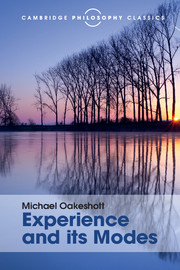Summary
It is, I suppose, the ambition of everyone who thinks to understand himself, and of every writer to be understood; whether the writer can also convince and persuade is a matter upon which he is wise to be indifferent. But, in order to be understood he will set out his view as completely and as clearly as he is able. For what is either partial or confused will at once be ambiguous. It is difficult, however, in a long argument to preserve a continuous emphasis upon the view as a whole; it is difficult to be certain that what is taken for the whole is actually complete. I propose, then, in this conclusion to offer a brief restatement of the general view I have been defending, and to show also how this general view is capable of meeting difficulties which any view of the character of experience should be prepared to meet, to show how (though incomplete as it stands) this view might be completed.
Theory of experience and its modes restated
My view is, in the first place, that experience (by which I mean the single and indivisible whole within which experiencing and what is experienced have their place) is always a world. Not only must we say that with every experience there comes a world of experience; we must say that every experience is a world. What is given in experience is a world, and what is achieved is this given world made more of a world. What is given in experience is single and significant, a One and not a Many.
Secondly, experience implies thought or judgment; it is always and everywhere a world of ideas. Sensation, perception, intuition, feeling and volition are never independent kinds of experience, they are different levels or degrees of judgment. What is given in experience is a world of ideas, and what is achieved is that world of ideas made more of a world. There is no experience which is not an idea, and no idea which is not a world.
Further, truth is the world of experience as a coherent whole; nothing else is true, and there is no criterion of truth other than this coherence. Thus, truth and experience are given together, and it is impossible to separate them.
- Type
- Chapter
- Information
- Experience and its Modes , pp. 248 - 274Publisher: Cambridge University PressPrint publication year: 2015

